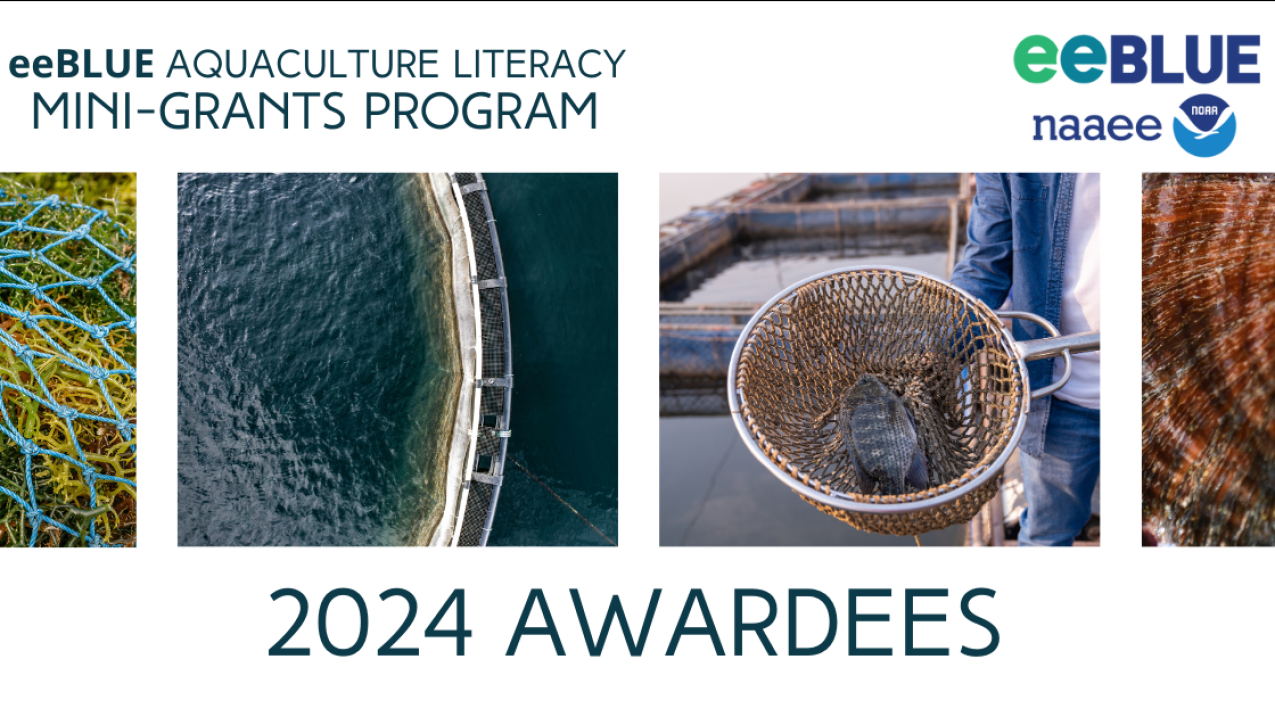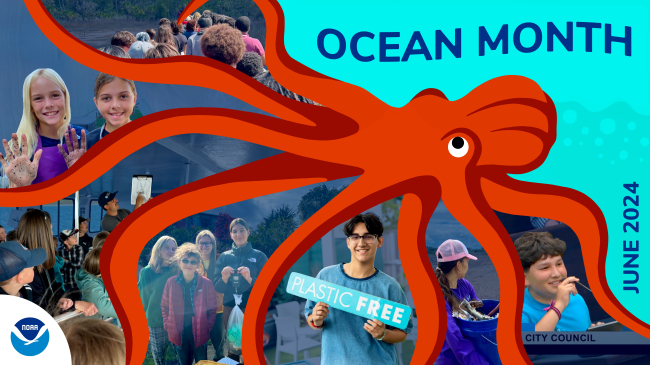NOAA and the North American Association for Environmental Education offsite link are awarding $165,000 to nine projects that aim to enhance aquaculture literacy. Selected projects offsite link will reach community members in eight states, many of whom have never had access to this level of aquaculture outreach and education resources.

The eeBLUE Aquaculture Literacy Mini-Grants Program announces the 2024 awardees. (Image credit: NAAEE, the North American Association for Environmental Education)
Awardees of the second cohort of the Aquaculture Literacy Mini-Grants program offsite link are forging lasting partnerships across informal learning institutions (e.g., aquariums), aquaculture industry (e.g., shellfish, finfish, and seaweed farmers), and NOAA to co-develop innovative educational experiences that explore aquaculture topics. Opportunities include everything from farm tours, online cooking classes, and podcast episodes to exhibit and curriculum development. By requiring applicants to build partnerships across the education, industry, and research sectors, selected projects will pull from each partner’s unique expertise to address gaps in aquaculture literacy.
Thanks to this eeBLUE funding, we are excited to launch a new project that connects chefs, farmers, and the public through some of Maine’s best-farmed products, allowing new audiences to directly engage with sustainable seafood.
The Aquaculture Literacy Mini-Grants Program is part of a partnership between NAAEE and NOAA. Known as eeBLUE offsite link, NAAEE and NOAA’s Office of Education have a five-year partnership to increase environmental and science literacy among our partners and external networks. Funding for the program is provided by NOAA Fisheries, the National Sea Grant Office, and the NOAA Office of Education, and administered by NAAEE. Selected projects are implementing locally relevant, needs-based aquaculture literacy projects that are responsive to the following goals of NOAA’s Community of Practice for Aquaculture Literacy (CoPAL):
- Bringing aquaculture education programming to institutions and/or target audiences currently lacking resources;
- Building the capacity of environmental education providers to offer high quality programming in informal and formal settings by matching aquaculture communication needs with existing research;
- Developing creative approaches for public engagement that promote a culture that values innovation, exploration, and community-relevant learning as a context for improving public aquaculture literacy and
- Identifying ways to integrate aquaculture topics into broader seafood communications, enhancing public understanding that wild capture fisheries and farmed seafood are intertwined.
From 2021-2023, the first cohort of this program built diverse, collaborative networks in ten communities across the United States. Their reported outcomes offsite link underscored the effectiveness of small-scale grant-making and the significance of flexibility and responsiveness in meeting partners where they were.
2024 Aquaculture Literacy Mini-Grant awardees
| LEAD INSTITUTION | PROJECT | PRIMARY PROJECT LOCATION |
|---|---|---|
| IBSS Corp. | Tide to Table, Farm to Food: Exploring the Merrior of Ocean-Farmed Seafood | Washington State |
| Maine Aquaculture Innovation Center | Farmers MAI-KIT (Maine Aquaculture Innovation Kitchen): Interactive, Live-streamed Cooking Classes Featuring Maine Chefs, Farmers, and Aquaculture Products | Walpole, Maine |
| Martha’s Vineyard Shellfish Group | Expanding Social License for Public and Private Aquaculture on Martha's Vineyard | Oak Bluffs, Massachusetts |
| North Carolina Sea Grant | Advancing Shellfish Mariculture Literacy in North Carolina | North Carolina |
| Saltwater Classroom, Inc. | Empowering Ocean Stewards: Restorative Aquaculture and Inclusive Oyster Farming Education | Southern Maine |
| South Carolina Aquarium | Increasing Oyster Aquaculture Awareness in Charleston, South Carolina | Charleston, South Carolina |
| Tampa Bay Watch Discovery Center | From Hatchery to Habitat: How Conservation Aquaculture Benefits the Bay | St. Petersburg, Florida |
| University of Maryland | Aquaculture in Agriculture | Caroll County, Maryland |
| University of New Hampshire | Developing and Piloting an Aquaculture Podcast to Enhance Aquaculture Literacy in the Northeast | Durham, New Hampshire |
The North American Association for Environmental Education and eeBLUE
The North American Association for Environmental Education (NAAEE) offsite link is building partnerships that support the mutual science technology engineering math (STEM) education goals of the National Oceanic and Atmospheric Administration (NOAA) and the U.S. Department of Education through an exciting collaboration called eeBLUE offsite link. eeBLUE is a $7 million, five-year partnership agreement between NOAA and NAAEE to help create a more environmentally literate society that has the knowledge, skills, and motivation to conserve our natural resources and build more resilient communities across the country. It is also strengthening professional networks, supporting high-quality STEM education, and providing education and outreach for educators and other audiences.
Through eeBLUE, NAAEE offers organizations opportunities to apply to the eeBLUE Aquaculture Literacy Mini-Grant program offsite link. These mini-grants provided informal learning institutions (e.g., aquariums), aquaculture industry (e.g., shellfish, finfish, seaweed farmers), and NOAA partners with support for the co-development of innovative educational experiences that explored aquaculture topics. Successful proposals use the unique education mission of the eeBLUE partnership as a context for engagement and advancement of public aquaculture literacy.
To learn more and follow our partners’ eeBLUE journey, please visit their webpage and follow NAAEE on Facebook and Twitter @TheNAAEE.




